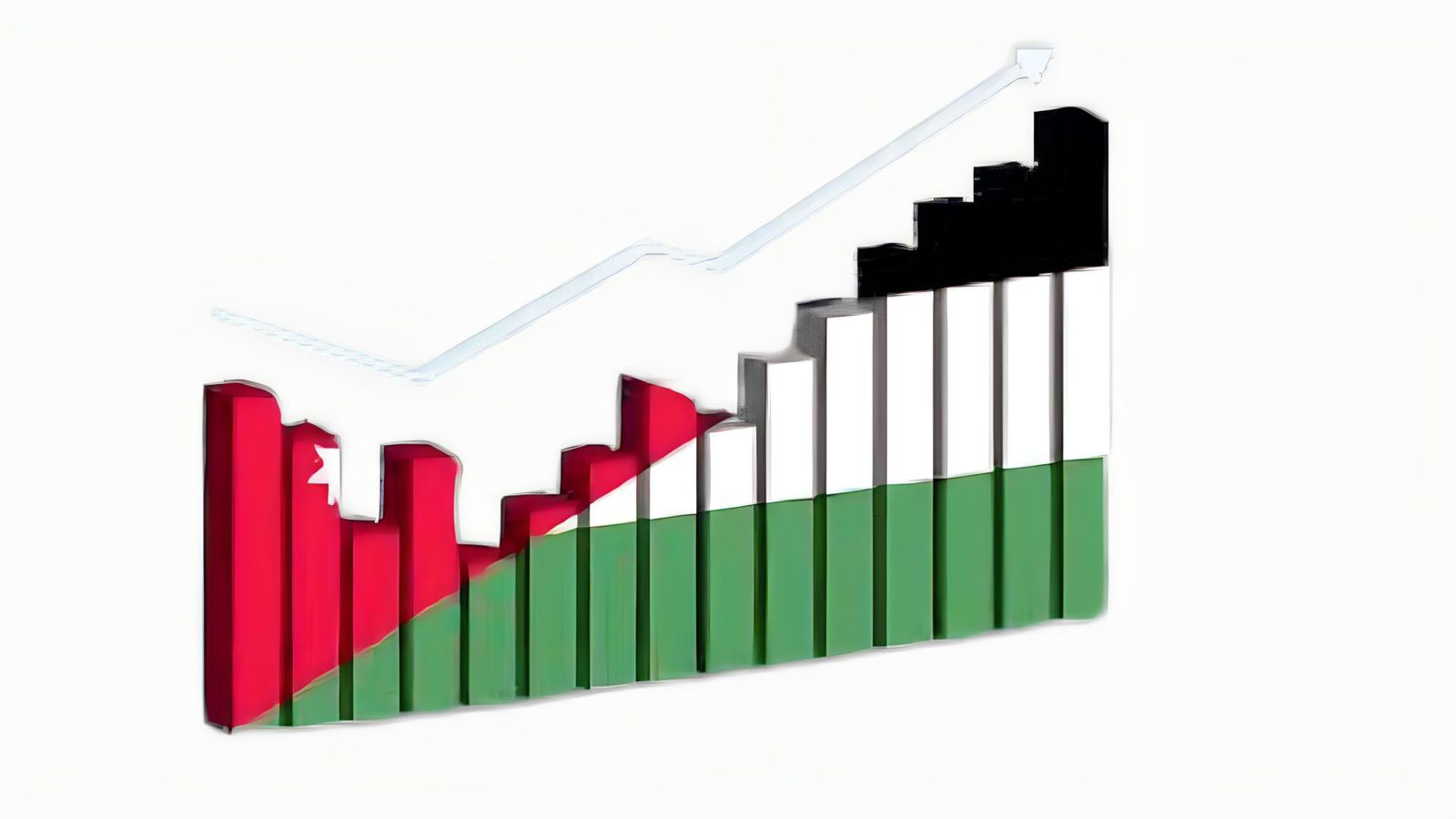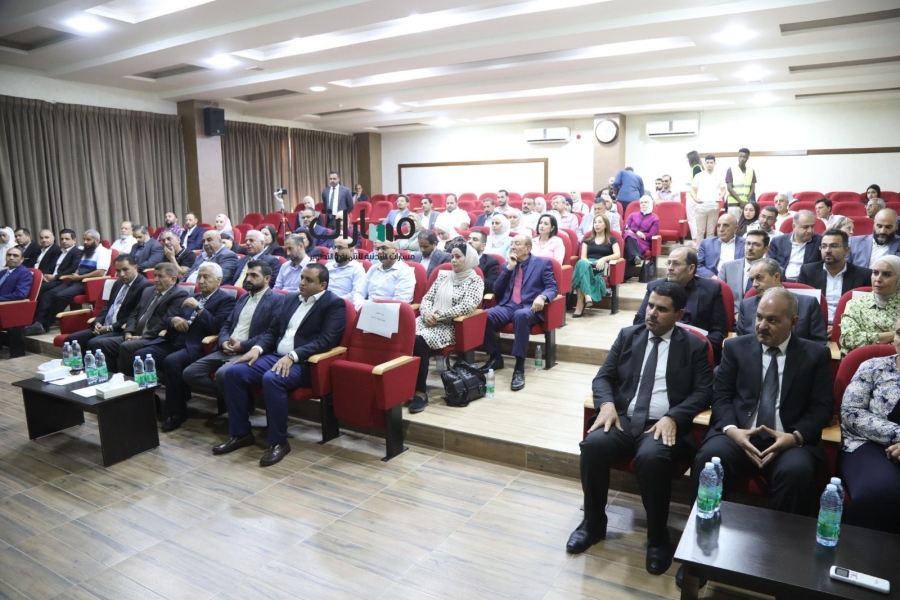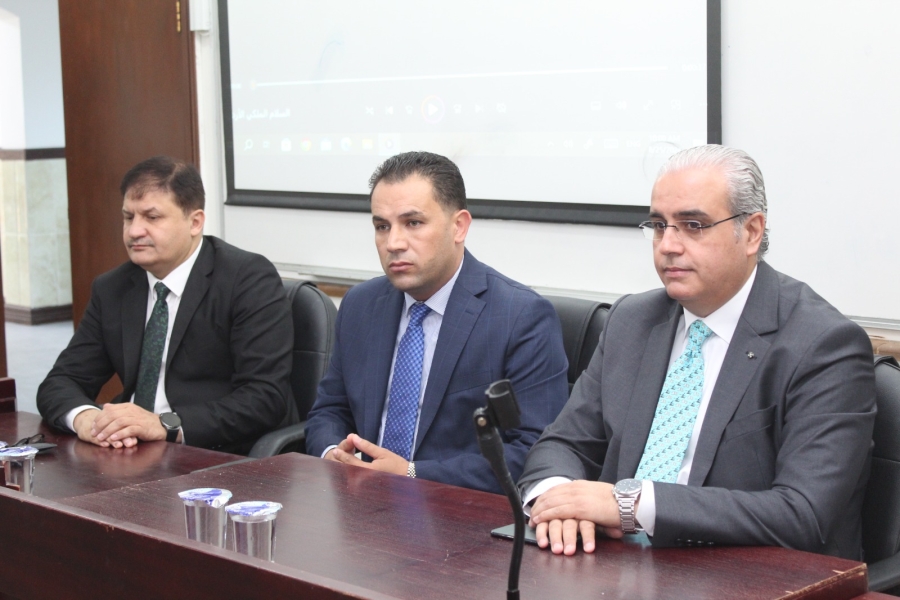“مسارات الأردنية”.. كيف نحقق إصلاحا اقتصاديا يحاكي الرؤية الملكية؟

– تأكيد ضرورة تحديد السردية والهوية الاقتصادية الأردنية ـ دعوة للالتزام بقائمة أولويات استثمارية عابرة للحكومات – تأكيد أهمية الانتقال إلى مفهوم دولة الإنتاج بدلا من الدولة الريعية ـ الفقر والبطالة نتاج تدني النمو وعجز السياسات الاقتصادية والاستثمارية – مطالب بقرارات إجرائية سريعة لتحريك عجلة الاقتصاد – عشرات القوانين والتشريعات بحاجة للتعديل – دعوة للتخلص من إجراءات حكومية "عقيمة” في ملف الاستثمار – اعتبار أن الدعم الحكومي للجامعات "تمويل للبطالة” – تأكيد ضرورة القضاء على أي فساد يزيد الإنفاق العام – رفع كفاءة القطاع العام ضرورة ملحة – معضلة في الانتقال إلى مرحلة تنفيذ المشاريع – المنظومة الاجتماعية هي السبب الأول لضعف المشاركة الاقتصادية للمرأة عقدت مؤسسة مسارات الأردنية للتنمية والتطوير، الأربعاء، في مقرها بالعاصمة عمان، جلسةً حواريةً مغلقة، تحت عنوان "مسار الإصلاح الاقتصادي بما يوازي الإصلاح السياسي”، وذلك في أعقاب تأكيد جلالة الملك عبدالله الثاني، خلال لقائه مؤخرا رئيس وأعضاء لجنة تحديث المنظومة السياسية، أن المسار السياسي يجب أن يتزامن مع مسار آخر اقتصادي وإداري، مشيراً جلالته إلى أنه وجه الحكومة لوضع برنامج عمل اقتصادي واضح المعالم خلال أسابيع، مرتبط بمدد زمنية محددة لتنفيذه.
ولفت جلالة الملك إلى أهمية أن يكون البرنامج بالشراكة مع القطاع الخاص لتحقيق التعافي الاقتصادي جراء الأزمة التي مرت بها القطاعات المختلفة، ولتحقيق مستويات النمو والتشغيل اللازمة لتحريك عجلة الاقتصاد والمشاريع التنموية، وتحسين الخدمات المقدمة للمواطن بشكل ملموس. قبل ذلك، وخلال لقاءاتٍ عديدة لجلالة الملك مع اقتصاديين في قطاعاتٍ مختلفة، جدّد جلالته التشديد على ضرورة إجراء الإصلاحات الاقتصادية بموازاة الإصلاحات السياسية، وضرورة توضيح الحكومة لآليات تطوير القطاعات الاقتصادية بالتعاون مع القطاع الخاص، وفق خطط بمددٍ زمنية، لتحقيق النمو الاقتصادي والتشغيل وتحسين الخدمات المقدمة للمواطنين.
مقدمة: يعيش الأردن أزمةً اقتصاديةً صعبة متراكمة، لم تكن وليدة الظروف الراهنة، بل ناجمة عن مجموعة من المشاكل الاقتصادية المتراكمة، التي ضاعفت حدّتها جائحة كورونا، حتى أصابت الاقتصاد الوطني بأسوأ انكماش يشهده منذ 3 عقود، وأدت إلى ارتفاع البطالة إلى نسب غير مسبوقة، تبلغ 50% لدى فئة الشباب، كما تسببت بارتفاع المديونية إلى مستوياتٍ خطرة.
كما أن تفاقم المشكلات الاقتصادية المتراكمة، واقتراب المديونية من "الخطوط الحمراء”، واتساع شرخ الثقة بين المواطن والحكومة، كلها عوامل تؤكد ضرورة تحديد رؤية شاملة مبنية على واقع الاقتصاد الأردني، تهدف إلى رسم ملامح السياسات الاقتصادية الأردنية، بما يُسهم في بناء هوية الاقتصاد الوطني بصورةٍ واضحة.
وعلى الرغم من الإقرار بأن هناك العديد من الملفات الاقتصادية الشائكة التي ينبغي النظر إليها، إلا أن هناك مَن يتحدث- وفق رؤيته-، بأن الأردن في الفترة الراهنة، هو أقرب ما يكون للاعتماد على الذات في تاريخ الدولة، وأنه تقدم في عددٍ كبير من الملفات الأخرى؛ بما في ذلك الإنفاق على التعليم، والإنفاق على الصحة، وانخفاض معدل الجريمة. وفي ظل الجائحة، يرى مراقبون أن البنك المركزي الأردني، أدى دوره واستخدم- إلى حدٍّ ما- أدواته الممكنة لتحفيز النمو الاقتصادي، لكن هناك قلقًا بشكلٍ دائم لدى الأردنيين؛ نتيجة المؤشرات الاقتصادية في الأوقات الراهنة، خصوصًا فيما يتعلق بالتدفقات النقدية بجميع أشكالها، كما أن هناك هواجس كامنة بتكرار سيناريو الأزمة المالية لعام 1989، وتكرار السيناريو ذاته بكل تجلياته الصعبة، ان لم تمض المملكة بعملية الإصلاح المطلوبة وتنفيذ مشروع اصلاح جذري لتجنب هذا المصير.
وفي المقابل، يؤكد البنك المركزي أن الجهاز المصرفي قوي ومتين وكل مؤشرات المتانة الموجودة، وعلى صعيد الاستقرار النقدي، فإن سعر صرف الدينار الأردني بقي ثابتًا منذ العام 1995، كما أن احتياطي البنك المركزي البالغ اليوم 15.9 مليار دولار، هو أعلى مستوى احتياطي وصلت إليه المملكة في تاريخها، ما يخفف من وطأة الهواجس المعلقة بأزمة تحاكي ما وقع قبل أربعة عقود.
التوافق على أن الحلول ليست قريبةً لخلق واقع اقتصادي جديد في المملكة واضح بين الخبراء، بيد أن ذلك لا يعني إغفال البحث والنظر إلى الحلول الإجرائية السريعة التي يمكن اتخاذها على المدى القصير والمتوسط، بحيث تخدم تسيير أعمال القطاعات المختلفة، كلٌّ حسب احتياجاته، وفي الوقت ذاته، لا تُثقل كاهل الموازنة العامة، ولا تحتاج للتعديلات التشريعية التي تستغرق وقتًا طويلًا لإتمامها. ذلك كله، يستوجب العمل المشترك بين القطاعات كضرورة أساسية للإصلاح الاقتصادي، بينما يرى آخرون أن التوافق على ماهية الهوية الاقتصادية للدولة، وهو أمر استراتيجي وضرورة ملحة للمضي قدمًا بالإصلاح الاقتصادي وتجاوز غياب التخطيط والعشوائية في العمل الذي أوصل الاقتصاد إلى ما هو عليه اليوم.
وبلغ إجمالي الدين العام 33.494 مليار دينار حتى نهاية الربع الأول من العام الحالي، منها 6.67 مليار دينار يحملها صندوق استثمار أموال الضمان الاجتماعي، فيما بلغت نسبة الدين العام من الناتج المحلي الإجمالي 106.9% حتى نهاية الربع الأول من العام، كما سجلت الموازنة عجزًا بلغ 274 مليون دينار في الفترة ذاتها، وفق نشرة مالية الحكومة العامة لشهر نيسان (أبريل) الماضي.
وارتفع معدل البطالة خلال الربع الأول من العام الحالي إلى 25%، مقارنةً مع 19.3% خلال الربع الأول من العام الماضي، بنسبة ارتفاع بلغت 22.8%، وفقًا لبيانات دائرة الإحصاءات العامة في تقريرها الربعي حول معدل البطالة في المملكة للربع الأولمن العام 2021. أما نسبة الفقر المطلق بين الأردنيين، فقد وصلت إلى 15.7%، بواقع 1.069 مليون أردني، فيما بلغت نسبة فقر الجوع (الفقر المدقع) في الأردن 0.12%، أي ما يعادل 7993 فردًا أردنيًّا، وذلك وفقًا لأحدث مسح خاص بدخل ونفقات الأسرة نفّذته دائرة الإحصاءات العامة في الأعوام (2017-2018).
وبحسب الدائرة، ارتفع الرقم القياسي العام لأسعار المستهلك (التضخم) لشهر آذار (مارس) من العام 2020، ليصل إلى 102.05 مقابل 99.98 مقارنةً بالشهر ذاته من العام 2019، مسجلًا بذلك ارتفاعًا نسبته 2.07%.
كما بلغت نسبة انكماش الاقتصاد الأردني -1.6% خلال الربع الرابع من العام 2020، مقارنةً بنمو إيجابي بلغت نسبته 2.1% في الفترة نفسها من العام 2019، وفق بيانات دائرة الإحصاءات العامة.
وفي المقابل، بلغ العجز في الميزان التجاري (والذي يمثل الفرق بين قيمة المستوردات وقيمة الصادرات الكلية) 5888.2 مليون دينار، مسجلًا بذلك انخفاضًا خلال الأشهر الأحد عشر الأولى من العام 2020، نسبته 17.8% مقارنةً بالفترة ذاتها من العام 2019.
وانخفض المؤشر العام لسوق عمّان المالي بنسبة 13.2% في العام 2020، ويعتبر هذا الانخفاض كبيرًا مقارنة بالسنوات السابقة؛ ويعود سببه إلى تراجع مؤشر البنوك والمؤسسات المالية، وفق ما أوضح منتدى الاستراتيجيات الأردني، في تقريره الصادر بعنوان "الاقتصاد الأردني في عام 2020”.
وبحسب التقرير، انخفضت تحويلات العاملين الأردنيين في الخارج، خلال السنة المالية 2020، من 599 مليون دينار خلال الربع الثالث من العام 2019 إلى 541 مليون دينار للربع الثالث من العام 2020. وناقش المشاركون في الجلسة، المفاصل الأساسية التي تحكم العملية الاقتصادية، والتي ينبغي الانطلاق منها والعمل عليها في مشروع الإصلاح الاقتصادي، باعتبارها الأركان الأساسية التي تلعب دورًا كبيرًا في الإصلاح الاقتصادي المنشود، وهي:
المحور الأول: الهوية الاقتصادية تحديد هوية الاقتصاد تعد الركيزة الأهم قبل السير بالعمل، بحيث تكون كل الإمكانيات مسخرة لخدمة وتعزيز هذه الهوية، وتكون القوانين والتشريعات والأنظمة والإجراءات كلها تصب في خدمة هذه السردية والهوية الاقتصادية والاستثمارية التي يتفق عليها الأردنيون، إذ لا يجوز أن يكون الأردن كما هو عليه اليوم، بل يجب تحديد السردية الاقتصادية وفقًا لما يملك الأردن من إمكانيات، وما هو قادر على تنفيذه؛ لذلك فإن الهوية الاقتصادية الاستثمارية مهمة، وعلى ضوئها يبني الأردن ما يريد الوصول إليه ويتم تحديد الأولويات الاقتصادية بناء على ماهية الهوية الاقتصادية.
وفي السياق ذاته، هناك من يرى أن الأهم في الإصلاح الاقتصادي، هو مدى تناغم السياسات الاقتصادية وإمكانية قراءتها ومعرفة مسارها الذي تتجه نحوه، وكمّ الجهد المبذول في موضوع المراسلة والتواصل بالسياسات الاقتصادية، ومقدار اليقين مما هو آتٍ فيما يخص السياسات الاقتصادية، بالإضافة إلى مستوى المصداقية الذي تتمتع به هذه السياسات.
ومما لا شك فيه، أن قرار تحديد هوية الاقتصاد وسرديته، مسألة يتشارك بها الجميع، سواء السلطات الدستورية أو القطاع الخاص أو مؤسسات المجتمع المدني، بحيث يتم تجاوز المصالح القطاعية والنظر للصورة الأكبر التي تخدم الحالة الوطنية العامة.
وعند الحديث عن الاقتصاد وتحديد الهوية، سواء كان اقتصاد خدمات أو صناعة أو غيره، فالمهم أن يتخذ القرار من جميع الشركاء ويشمل الحكومة والقطاع خاص والسلطة التشريعية المختصة بوضع الإطار التشريعي، للتوصل لصيغة تعطي الأردن ميزات تنافسية، لكن كل ذلك لم يُرسم ويُحدد حتى اليوم، وبدون خلق قيمة تنافسية لاقتصاد الأردن ليكون منافسًا لما حوله، فلن يتمكن بالتأكيد من التقدم بالاستثمار.
المحور الثاني: الاستثمار تتجاوز أهمية محور الاستثمار دوره المهم في معالجة المشكلات الاقتصادية، بل يتعدى ذلك في تحقيق هدف أكبر يتمثل ببناء روح مواطنة، حيث إن المشاريع المقامة بالنهاية تنعكس على المجتمع وبما يصب في مصلحة المواطن، شريطة أن لا يعتريها فسادا، وجعل المواطن شريكا في هذا الاستثمار من خلال إصدار السندات الاستثمارية.
وتتجاوز أهيمة الاسثمار دوره في خلق فرص العمل وتحسين المؤشرات المالية والنقدية فقط، إلى بناء ثقافة تجسر الفجوة بين الاستثمار والمجتمعات المحلية، وتخلق علاقة صحية بينهما تقوم على تبادل المصالح بدلا من التشكيك والعداء القائم حاليا، بحيث نتخلص من مقولة "كل مستمر فاسد إلى أن يثبت العكس”.
وعلى المدى الطويل، لا بد من معرفة ما الذي يريده الأردن، وهنا نعود إلى المحور السابق الذي يركز على تحديد الهوية وبناء السردية حول الاقتصاد، بحيث تكون الحكومة اللاعب الرئيسي كمنظم ومراقب ومشبك بين جميع الأطراف، يلي ذلك بناء الأولويات الاستثمارية والاقتصاددية بما ينسجم والهوية والسردية.
وعند النظر على المدى القصير والمتوسط، فهناك من يلفت إلى أهمية النظر للمشاريع الكبرى، وليس بالضرورة أن تكون المشاريع الكبرى مكلفة للخزينة، فهناك قائمة لدى الحكومة بالمشاريع الكبرى التي تم إعداد دراساتها بشكلٍ كامل، وهي جاهزة لتُطرح كعطاءات على القطاع الخاص، وهي لا تحتاج إلى تمويل حكومي لتنفيذها من الخزينة، وإنما المتقدم لهذه العطاءات هو الذي يعمل على تمويل تنفيذها، سواءً بنظام الـ”BOT” أو "BOO” أو غير ذلك من النماذج الاستثمارية المختلفة، وهذه الإجراءات على المدى المتوسط، قد تُحدث أثرًا حقيقيًّا يشعر به المواطن.
أما على المدى القصير، فمن الضروري أن تبدأ الحكومة بمشاريع كبرى، ولكن الأردن لم يبدأ بأي مشروع كبير في آخر 4 أو 5 سنوات، وعلى صعيد الاستثمار، هناك مساران للمشاريع؛ منها المشاريع الفورية، والتي تُحرك الاقتصاد الوطني اليوم؛ لأنه وخلال آخر 100 سنة، الحكومة كانت هي التي تُنفق وهي التي تستهلك، ولا بد من تغيير النهج في تمويل المشاريع الكبرى، كما أن القطاع الخاص لم ينضج بعد لمرحلةٍ يُحرك فيها الاقتصاد بهذا البلد، وبالتالي ينبغي البدء بمشاريع كبرى، وتحديد مشروع واحد كبداية.
وفي إطار الحديث عن التمويل أيضًا، ينبغي تحديد مصادر التمويل الموجودة في الأردن؛ وهي وزارة المالية، المؤسسة العاملة للضمان الاجتماعي، البنوك، الأردنيون، والمغتربون. ولكن عند الحديث عن وزارة المالية كمصدر للتمويل، فليس من المتوقع أن تُقدم تمويلًا بقيمة 500 أو 10 أو 20 مليون دينار أردني، بل المتوقع منها اليوم أن تُوقف الاقتراض الداخلي، فلا يجوز أن يكون النمو بالسالب، ولا يستطيع الأردن أن يتحمل نسبة بطالة أكثر من 25%، ومصادر التمويل يجب أن تكون داخلية. كما يجب بناء روح مواطنة، من خلال إقناع المواطن بأن هناك مشروعًا كبيرًا سيتم إنشاؤه في الأردن، يصب في مصلحة المواطن، ولن تتخلّله قصص فساد، وبالتالي على الأردن أن يسير بنهج مصر في إصدار السندات الاستثمارية، وأن يبني هذه الثقافة، وهذا النهج السريع هو إجرائي. وفي هذا السياق، هناك إشكالية في أنصاف الحلول، فاليوم ونظرا للإمكانيات المحدودة لدى الخزينة، لا توجد حكومة قادرة على تمويل المشاريع الكبرى، بيد أن المطلوب وعقب تحديد الهوية والسردية، هو توجيه المبالغ المخصصة على محدوديتها إلى القطاعات المتفق عليها.
فلا يمكن لحكومة أن تُنفق كل ما تستطيع توفيره بواقع (40 – 50) مليون دينار على قطاع الـIT على سبيل المثال، أو تخصيص 5 ملايين للـIT و4 ملايين لقطاع السياحة، بل يجب وضع قائمة أولويات لا قائمة أمنيات.
فعندما أنفقت الحكومة 10 ملايين دينار على الـ”low cost carriers”، ظهر الأثر الاقتصادي لها فورًا، وكان واضحًا قبل نهاية العام، وهناك قطاعات أخرى عندما يتم إنفاق هكذا مبالغ عليها يظهر أثر الإنفاق عليها خلال (1 – 3) أعوام؛ لذا ينبغي وضع قائمة أولويات والإنفاق بناءً عليها، مع النظر إلى القطاعات الأكثر تشغيلًا للأردنيين.
وبحسب الدراسات، فإن القطاعات الأكثر تشغيلًا للأردنيين تتمثل بالصناعة والزراعة، كما ينبغي النظر إلى القطاعات الأكثر أثرًا اقتصاديًّا؛ مثل الـIT والسياحة، لكن هناك حاجة لقائمة أولويات والالتزام بها دون إجراء تغييرات.
وعلى صعيد الاستثمار أيضًا، هناك مَن يشير إلى ضرورة الواقعية وفهم الواقع، وإدراك أنه لا يمكن المضي قدمًا بالاستثمار ما دام اتخاذ القرارات المتعلقة فيه تدار بالطريقة التقليدية ذاتها، إذ يتم التعامل بشأنها قطاعيا؛ لذلك فإن مسألة "تغيير 38 قانونًا للتمكن من تسيير القرارات الاستثمارية بالطريقة التي نفكر بها فيما بيننا” هي مقولة واقعية، يضاف إلى ذلك المحسوبية في اتخاذ القرارات الاستثمارية، وبالتالي ينبغي تعديل طرق أو نهج أخذ القرارات الاستثمارية في الأردن على المدى الطويل.
ولا يمكن أن يكون هناك نموًّا اقتصاديًّا من غير إصلاح جمركي ومن دون إصلاح ضريبي حقيقي وليس إصلاحًا سطحيًّا؛ كما ينبغي مراجعة الدعم الذي تُنفقه الحكومة- ليس للمواطن- وإنما الدعم الذي يذهب هباءً منثورا، والإصلاح الجمركي والضريبي وغيره من المقترحات، كلها إجراءات أو تعديلات بأنظمة أو تعديلات بقوانين تحارب البيروقراطية، تعيق الاستثمار والإصلاح بمختلف أطيافه.
من جانبٍ آخر، ثمة رأيٌ يركز على ضرورة تسهيل الإجراءات "العقيمة” في القطاع العام، فهناك العديد من التعقيدات في إجراءات الاستثمار بالقطاع العام، وتدني الكفاءة في هذا القطاع هي المعضلة التي تسببت بالعناء للمستثمرين، كما أن هيئة الاستثمار يقع على عاتقها دور ومسؤولية كبيرة في تحسين سمعة الأردن بالخارج من حيث الاستثمار بما يُسهم في جذب المستثمرين.
المحور الثالث: كفاءة القطاع العام نتيجة ضعف أثر عمل الحكومات وسياساتها في توسيع حجم قاعدة الاقتصاد، وفشلها بالانتقال إلى مفهوم دولة الإنتاج بدلا من الدولة الريعية، ونتيجة ضعف نتائج مخرجات التعليم في تغيير ثقافة المجتمع وإبقاء اعتماده على الحكومة كمشغل، مع ما رافق كسل وفشل الحكومات في الانتقال من الرعاية للإنتاج من سياسات استرضائية بديلا لإصلاح حقيقي يكون الفرد فيه جزء من صناعة القرار، كل ما سبق صب بتضخيم حجم القطاع العام ، حتى بلغ درجة حساسة وصار ثقله عبئا على الاقتصاد، ليس ذلك فحسب بل خلق قطاعا عاما متدني الكفاءة وبكلفة مرتفعة، حيث تبلغ قيمة فاتورة رواتب القطاع العام حوالي 400 مليون دينار شهريا، الأمر الذي يتطلب خطة إصلاحية تسهم بتخفيض حجم القطاع العام مقارنة بالناتج المحلي الإجمالي، وزيادة إنتاجيتهم حتى لا يبقوا عبئًا على الحكومة والمستثمرين والأجيال المقبلة.
ولمعالجة هذا المحور وما آل إليه، يلزم النظر إلى بندي النفقات بحيث يتم تخفيض النفقات الجارية وزيادة نسبة تغطيتها من الإيرادات المحلية، وأيضا السعي لوقف الهدر في الإنفاق العام والذي قدره بعض وزاء المالية بنسبة 15٪ من الإنفاق العام، وتكريس مفهوم الموازنة الشفافة كواحدة من أدوات الحكم الديموقراطي.
المحور الرابع: عجز المالية وعجز ميزان المدفوعات هناك مَن يرى أن الإصلاح الاقتصادي المطلوب، هو معالجة الاختلالات الاقتصادية الهيكلية الموجودة بالاقتصاد، وهناك خللان واضحان بالاقتصاد الأردني؛ هما عجز الموازنة الدائم وعجز ميزان المدفوعات، وكل واحد منهما يحتاج إلى منظومة اقتصادية لإصلاحه، وهذا هو لب الإصلاح الاقتصادي.
وعلى صعيد العجز في الموازنة، هناك إيرادات ونفقات، وعلى نطاق النفقات، فأولًا، ينبغي تحديد الفساد، ووقف أي فساد يؤدي إلى زيادة نفقات، كما يلزم ضبط نمو النفقات الجارية وأيضا في جانب النفقات تدعم الجامعات الرسمية دعمًا كاملًا، بينما الثانية تُخرج أجيالًا لا تجد فرص عمل لها، وهذا يتطلب إصلاحًا كونه يُعتبر "تمويلًا للبطالة”؛ لذا يجب ربط دعم الجامعات مع أداء أساتذة الجامعة وخرّيجيها والإداريين العاملين بها.
أما بشأن جانب الإيرادات، فإن الشق المتعلق بحجم العبء الضريبي قد وصل أقصى حدوده، إذ أجريت دراسات عن العبء الضريبي والتي كشفت عدم إمكانية فرض أي ضرائب جديدة، إنما يلزم البحث في أوجه زيادة الإيرادات غير الضريبية المتاتية من الاستثمار، كما أن التهرب الضريبي الذي تعمل الحكومة عليه هو أحد الإصلاحات المنتظرة لزيادة الإيرادات بعيدا عن جيب المواطن.
وفيما يتعلق بالإصلاحات التي ينبغي إجراؤها لإصلاح عجز الميزان التجاري، فنحتاج إلى التركيز على شق المستوردات لمعالجة عجز ميزان المدفوعات من خلال تخفيض عجز الميزان التجاري)، وذلك بتقليل المستوردات والتخفيف من استنزاف الدولارات التي تخرج من الأردن، وتشجيع الصناعات الأردنية واستهلاكها، وإحلالها محل المستوردات.
يقابل ذلك، زيادة الصادرات التي تُعد العنصر الأهم؛ لأنها تجلب للأردن من 7 إلى 8 مليارات دولار وقد يصل المبلغ إلى 10 مليارات دولار كما حصل في فترةٍ من الفترات، بينما المستوردات قيمتها 20 مليار دولار، بحيث تزيد قاعدة الإنتاج المحلي في قطاعات تنافسية تصديرية تسهم بزيادة الصادرات وتقليص المستورد.
المحور الخامس: الطاقة ما يزال قطاع الطاقة ونتيجة إدارته بشكل منفصل عن باقي القطاعات، يعد مساهما بتثبيط عجلة النمو الاقتصادي ويحد من قدرة عديد قطاعات على التطور ومنها الصناعة والزراعة والمياه وغيرها من القطاعات، فإحداث النقلة المطلوبة في المشهد الاقتصادي يحتاج إلى معالجة مختلفة للعلاقة بين قطاع الطاقة والقطاعات الأخرى حتى يتم رفع القيمة التنافسية للقطاعات المختلفة، وأيضا وضع حلول لكثير من المشكلات الناجمة عن طريقة إدراة ملف الطاقة.
فتكلفة الكيلو واط الواحد من الكهرباء تساوي 9 قروش، وهي تُباع للصناعة بـ26 قرشًا، وللمستشفيات كذلك، وفي المقابل الـ160 كيلو واط، تُباع بـ3 قروش، لكن إذا تم بيع الكهرباء للصناعة بسعر التكلفة (9 قروش) ستتمكن الصناعة الأردنية من منافسة الصناعة السعودية والمصرية وما حول الأردن من صناعات وكذلك الأمر بالنسبة للمياه وغيرها من القطاعات.
المحور السادس: صندوق استثمار أموال الضمان الاجتماعي أنُشئ صندوق استثمار أموال الضمان الاجتماعي في العام 2003، ليكون الذراع الاستثماري للمؤسسة العامة للضمان الاجتماعي لزيادة العوائد مع المحافظة على القيمة الموجودات، بما يُمكن المؤسسة من دفع التزاماتها المستقبلية تجاه متقاعدي الضمان الاجتماعي.
وبدأ الصندوق بموجودات قيمتها 1.6 مليار دينار ووصلت حتى تاريخ 31-3-2021 إلى 11.4 مليار دينار، وسوف تتخطى موجودات الصندوق هذا الرقم في الفترة المقبلة مع زيادة مؤشر سوق عمان المالي، أما محفظة الصندوق، فهي موزعة بواقع 70% بين سندات ونقد (وهو ما يُعتبر سيولةً عالية ومخاطر منخفضة)، و14% للأسهم، و6% للعقار، و3% للقروض، و3% للسياحة.
وصندوق الاستثمار هو صندوق الأردنيين، وأي نمو في الاقتصاد الأردني ينعكس إيجابًا على مؤسسة الضمان الاجتماعي والصندوق؛ لأن النمو في الاقتصاد يرفع عائدات الصندوق ويزيد اشتراكات الضمان. وفي هذا المجال، موّل الصندوق- من خلال التأجير التمويلي- مستشفى معان وحافلات التردد السريع ومستشفى الطفيلة ومركز جمرك عمان الجديد في منطقة الماضونة، والآن يدرس الصندوق تمويل مشاريع إنشاء مدارس مع الحكومة، وهي تزيد عوائد الصندوق بنسبة 7%.
وفيما يتعلق بدور صندوق الاستثمار في الإصلاح الاقتصادي، فهو يتطلع- إلى جانب المشاريع المتوسطة والصغيرة التي يهتم بها- إلى البنية التحتية؛ ولذلك عمل على تأسيس شركة مع البنوك التجارية، ولكن هناك مجموعة من التحديات التي يواجهها الصندوق في الدخول والمشاركة في إقامة المشاريع الكبرى.
ومن الإصلاحات المطلوبة، النظر بطريقة جديدة لإشراك الضمان في مختلف المشاريع الكبرى، طبعا وفقا لاحتياجات الصندوق نفسه وتطلعاته وليس من باب استسهال الحصول على التمويل لهذه الغايات. ومن المفيد أيضا، أن تنظر وحدة الشراكة بين القطاعين العام والخاص بطريقة مغايرة ترى أن في إشراك الضمان مصلحة عامة وطنية، لا سيما أن الحكومة تمضي قدمًا في إنشاء المشاريع الكبرى ومنها مشروع الناقل الوطني للمياه، بحيث يعطى الصندوق الأفضلية في مثل هذه المشاريع الكبرى لتعظيم المدخرات أولا، وتنفيذ المشاريع الرابحة ثانيا، وثمة منفعة ثالثة لمساهمة الصندوق بالمشاريع، فعندما يأتي المستثمر الأجنبي إلى الأردن ويلاحظ أن أكبر مستثمر أردني يُساهم في المشاريع هو الصندوق، يطمئن المستثمر ويمضي قدمًا بإقامة مشاريع استثمارية في الأردن.
وعلى صعيد سوق رأس المال، حيث يُشكل الصندوق حوالي 10.5% من سوق عمان المالي، إلا أنه غير قادر على العمل وبيع الأسهم في السوق، وبالتالي فهو غير قادر على تحقيق الربح، وكل أرباحه "دفترية”؛ لذا لا بد من دخول مستثمرين أجانب إلى السوق لشراء أسهم طويلة الأجل، بحيث يكونون مؤسسين وليسوا مضاربين.
كما يمكن تحفيز الاقتصاد من خلال صندوق استثمار أموال الضمان الاجتماعي، من خلال تسريع مشاريع الشراكة، وتطوير سوق رأس المال، وتعديل التشريعات، ورفع كفاءة القطاع العام.
المحور السابع: المشاركة الاقتصادية للمرأة المشاركة الاقصادية للمرأة الأردنية في أدنى السلم مقارنة بدول المنطقة الضعيفة، ويعود انخفاض معدل المشاركة للإناث في سوق العمل لعدة أسباب، هي العادات والتقاليد والمنظومة الاجتماعية التي تجعل المرأة خارج السوق، والسبب الثاني هو التشريعات؛ لذا لا بد من معالجة ذلك بما يُعزز مشاركة المرأة اقتصاديًّا.
أما السبب الثالث في تراجع مشاركة المرأة اقتصاديًّا، فيتمثل بالاختيار الخاطئ للتخصصات التي تلتحق بها الإناث في الجامعات، فعند النظر إلى أعلى 10 تخصصات جامعية تدرسها المرأة الأردنية والنظر إلى أعلى 10 تخصصات فيها نسب بطالة مرتفعة، يتضح أن المرأة تميل إلى الالتحاق بهذه التخصصات.
ولعل الحل يكمن في توسيع قاعدة المشاركة الاقتصادية للجميع (ذكورًا وإناثًا)، فزيادة النمو الاقتصادي يؤدي تلقائيا إلى استفادة المرأة من هذا النمو، لا سيما أن نسبة العاملين ممن يحق لهم العمل في الأردن تساوي 30% فقط من الذكور والإناث بشكلٍ عام.
كما أن معدل الإنتاجية في الاقتصاد ككل متدن، ما يعني أن المشكلة عامة بالمجتمع الأردني ولا تتجاوز 36٪، فيما أن حل جزء من مشكلة المرأة الأردنية وإدماجها في سوق العمل يحتاج إلى نظرة شاملة للإصلاح تطال جميع شرائح المجتمع، يلي ذلك سياسات تراعي النوع الاجتماعي لتحقيق العدالة وتحسين البيئة بما يخدم النساء ويحفز دخولهن لسوق العمل.
وفيما يتعلق بمحور التعليم، ينبغي توعية النساء بضرورة إكمال التعليم أو اختيار تخصصات يطلبها سوق العمل، خصوصًا أن 18% من السيدات يتزوجن قاصرات، كما ينبغي توعيتهن بضرورة الالتحاق بالتخصصات غير الراكدة أو المشبعة.
المحور الثامن: الفقر والبطالة علاج الفقر والبطالة يحتاج أولا إلى اعتراف بأن هذه المشكلات ناجمة عن تدني النمو وعجز السياسات الاقتصادية والاستثمارية، ولذا فإن معالجة عميقة وحقيقية لمشكلتي الفقر والبطالة مسألة تستغرق وقتا. لكن ثمة إجراءات- وليست قرارات لها كلف مالية على الخزينة أو قرارات تحتاج إلى تعديلات تشريعية تستغرق عدة أشهر حتى تصبح نافذة، وإنما قرارات إجرائية يمكن أن تُحدث أثرًا كبيرًا على المدى القريب على بعض القطاعات الفرعية، بما ينعكس بالنتيجة على الفقر والبطالة والمؤشرات الاقتصادية المختلفة.
ومن غير الممكن معرفة الإجراءات السريعة التي تحتاجها القطاعات المختلفة، إلا من خلال العاملين بالقطاعات كلٌّ على حدة؛ لذا ينبغي على الحكومة أن تعقد الاجتماعات المكثفة مع العاملين بالقطاعات الاقتصادية جميعها؛ لمعرفة النقاط التي ينبغي تعديلها وإعداد مصفوفات بشأنها والعمل على تنفيذها بما يصب في مصلحة القطاع ويُحسن من أداء الاقتصاد الوطني ككل.
وعلى المدى المتوسط، يتمثل الهم الاقتصادي بما يريده المواطن وما يبحث عنه صانع القرار، وذلك يضم عدة عوامل، لكن أهمها عاملين؛ هما تشغيل الأردنيين والفقر، الأمر الذي ينعكس بالنتيجة على أرقام الاقتصاد والنمو وغير ذلك من المؤشرات.
وفي هذا الصدد، ينبغي النظر إلى القطاعات الأكثر تشغيلًا للأردنيين وأكثر القطاعات أثرًا بالاقتصاد والفقر، والتي تحتاج إلى بعض الدعم على المدى المتوسط؛ لإحداث نقلة في ذلك، وهذه خطوة ممكنة. وثمة رأي مشابه، يقول إن أي هاجس اقتصادي موجود اليوم عند الحكومة أو الدولة، يتمحور حول الفقر والبطالة، واليوم الأردن تواجهه بطالة وفقر وتضخم، وعلى النخب الاقتصادية والسياسية أن تبدأ بأن تعي المصطلحات التي تستخدمها في حياتها اليومية (محاربة الفقر ومحاربة البطالة)، فالفقر والبطالة هما عرضان لعدم النمو الاقتصادي.
واليوم، لا يجوز الاستمرار بالقول إن النخب الاقتصادية والسياسية تريد أن تحارب الفقر والبطالة، بل عليها أن تُسمي القضايا بأسمائها، وأن تكون واضحة وصريحة مع نفسها ومع المواطنين، وأن تُقر بعدم وجود نمو اقتصادي، وأن الحكومة غير قادرة على خلق فرص عمل للأردنيين، وبالتالي فإن المواطن الأردني يزداد فقرًا. وفي هذا الصدد، لا بد من الإشارة إلى أن العالم ازداد فقرًا بنسبة 15% خلال السنة ونصف السنة الأخيرة، ومن غير المعلوم كم ازداد الأردنيون فقرًا في تلك الفترة، كما أن التدفقات الأجنبية في العالم انخفضت بنسبة 35% في آخر سنتين، بينما الدولة الوحيدة التي حافظت على التدفقات الأجنبية هي الهند.
وكذلك، فإن المجلس الاقتصادي والاجتماعي، أصدر دراسةً مؤخرًا، تقول إن الأردن حتى يتمكن من تحقيق منظومة أفضل بالاستثمار ينبغي تغيير أو تعديل 38 قانونًا، وهذا الرأي واقعي إذا أرادت النخب أن تُسمي الأمور بأسمائها، وبالتالي فإن على النخب اليوم، أن تعي أن المحرك المطلوب للحفاظ على الأمن المجتمعي- وهي أهم أولويات الدولة- أن تكون النخب واقعية بنسب النمو، وأن تعي أن المطلوب هو نمو الاقتصادي. واليوم أيضا، لا يجوز أن يستمر صناع القرار بمعالجة "السخونة”، وهي المظاهر لعدم النمو الاقتصادي، وبالتالي يجب القول إن المطلوب هو نمو اقتصادي وليست محاربة الفقر والبطالة، وبناءً على ذلك، ينبغي التفكير في كيفية تحريك النمو الاقتصادي في ظل انخفاض التدفقات النقدية العالمية (الاستثمارات الأجنبية)، وفي ظل الدراسة التي أطلقها منتدى الاستراتيجيات الأردني، والتي تُظهر انخفاض ثقة المستثمر الأردني إلى 55%.
لذا، ينبغي على النخب الاقتصادية والسياسية أن تكون واقعية في كيفية تحريك الاقتصاد الأردني، وأحد أسس وسبل وطرق تحريك الاقتصاد الوطني هو الاستثمار، لكنه أداة واحدة من بين عدة أدوات فعالة في تحريك الاقتصاد.
المحور التاسع: العمل والتنفيذ ضعف التنفيذ والالتزام بالخطط كان الأبرز على مدى السنوات الماضية، إذ يعمد صناع القرار إلى تأجيل مشاريع مهمة وضرورية، فيما يولد تأخير تنفيذها الأزمات ويعمق المشكلات، وعلى سبيل المثال، فإن أزمة المياه التي يعاني منها الأردن باعتباره ثالث أفقر دولة مائيا على مستوى العالم، يقابلها تأجيل لمشروع الناقل الوطني للمياه، في حين أنه ينبغي عمل مسار سريع للمشاريع ذات الأولوية، بحيث يتم إنجازها خلال فترةٍ معينة. المماطلة في التنفيذ أيضا يعكسها وجود 4 أو 5 مشاريع محددة في قانون الشراكة بين القطاعين العام والخاص؛ وهي مشاريع الـNBN (National Broadband Network Program)، ومشروع ناقل البحرين، وإعادة تأهيل المدارس، وإعادة تأهيل البنية التحتية لمطار ماركا، بالإضافة إلى مشروع آخر في العقبة، لكنها لم تُنفّذ حتى الآن، وليس هناك ما يمنع تنفيذها، وبالتالي فإنه يوجد خلل كبير في الانتقال إلى تنفيذ المشاريع.
لذا، فإن الإصلاح الاقتصادي يتطلب الجدية والشراكة بالعمل والتخطيط والتنفيذ، بينما في الاقتصاد الأردني، تعمل كل جهة تعمل بشكلٍ فردي في منحى ومعزل عن المؤسسات الاقتصادية الأخرى، وهناك ما يُسمى بـ”عقلية الصوامع” المنفصلة، وكل جهة تفكر بإطارها؛ لذا لا بد من أن تعمل جميع القطاعات بتشاركية عالية.
وشارك في الجلسة، ووزير الطاقة والثروة المعدنية الأسبق، الدكتور إبراهيم سيف، ووزير الدولة الأسبق لشؤون الاقتصاد، مهند شحادة، وزير الصناعة والتجارة والتموين السابق، الدكتور طارق الحموري، ، ونائب محافظ البنك المركزي، الدكتور عادل الشركس، ورئيسة صندوق استثمار أموال الضمان الاجتماعي، خلود السقاف، والأمينة العامة للمجلس الأعلى للسكان، الدكتورة عبلة عماوي، ومؤسس مركز "مسارات”، وزيرة الدولة السابقة لشؤون الإعلام، جمانة غنيمات، ومؤسس مركز "مسارات”، النائب السابق، وفاء بني مصطفى. يشار إلى أن "مسارات الأردنية للتنمية والتطوير”، هي مؤسسة مجتمع مدني لا تهدف إلى الربح، تأسست في العام 2021، وتختص بقضايا تعزيز حضور المرأة في الفضاء العام وتمكينها سياسيا واقتصاديا، ودعم وتحفيز مشاركة الشباب في العمل السياسي والتنموي، وتطوير وتعزيز قدرات الإعلام لمواكبة التطورات ليكون أداة للرقابة وسبيلا لتحقيق التنمية المستدامة والديموقراطية.
وتُركز "مسارات” على إجراء الدراسات والأبحاث المتعلقة بالمشهد الأردني ككل، وكذلك عمل قراءات تحليلية تهم صناع القرار في مختلف نواحي الحياة، إضافة إلى إجراء دراسات تحليلية للمشهد السياسي والإعلامي ومضمونهما.






